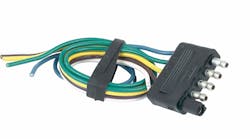In transportation, we have an immensely important connection between the tractor and the trailer. It’s true for light duty vehicles, as well as for commercial vehicles, both on-road and off-road. Why are we satisfied with a (mostly) power only connection between these two parts? We have 7 electrical power signals which are switched on/off on the tractor. We also have two air pressure lines that are switched on/off on the tractor side.
Twenty years ago, we established a standard for a low speed, low quality data signal to go from the trailer ABS to the tractor ABS to signal if the trailer ABS is working. It’s been far too long since we looked at a better way to connect these two important parts of a combination vehicle. As trailer ABS became a legal mandate, the industry struggled with the connections. Multiplexing, 13-pins, two connectors, and PLC4Trucks were debated. I was, personally, heavily involved in the debate.
SAE, TTMA, and TMC are starting to talk about the future of trailer connections as we all move toward Connected, Autonomous, Safer, and Electrified (CASE) combination vehicles. SAE J3008 has been in production for at least 3 years now. The Ford Motor Company has taken production deliveries of a special connector that provides a 7-pin trailer connection for light duty trailers according to SAE J2863 and adds a 12-pin accessory connector according to SAE 3008. This allows Ford to provide advanced safety features with cameras.
The extra 12 pins provide data connections according to the table. For commercial vehicles in Europe, the SAE J2691/ISO-11992 connector has 15 pins, including power and CAN (Controller Area Network) data communications. Another is ISO 12098 with a brake wear indicator, lift axle control and CAN.
For several years, an automatic coupling system according to ISO 13044-2 with 30 connections has been shown at truck shows. If we want to move toward more autonomous vehicles in the next 10-30 years, we need to consider a connection system that does not rely on a human.
My “ideal” next generation connection would include:
- Some backward compatibility
- 12/24 volt compatibility
- Single and 2-pin compatibility for those using such connections
- Globally standardized
- Truck OEM supported
- Trailer OEM supported
- Fleet supported
- Tier-1 supplier supported
- Wireless connections
- Positive mechanical connection
- Excellent sealing from moisture and debris
I’m still a bit of an idealist in wanting the perfect connection. However, I consider it ridiculous that I have dozens of dongles and interface cords for my personal electronics and fleets have a similar number for the different connections they need to make. We have too many, and they are the weakest link in our connections.
Let’s strengthen the connection between the tractor and the trailer. I hope I’ve made the CASE.



